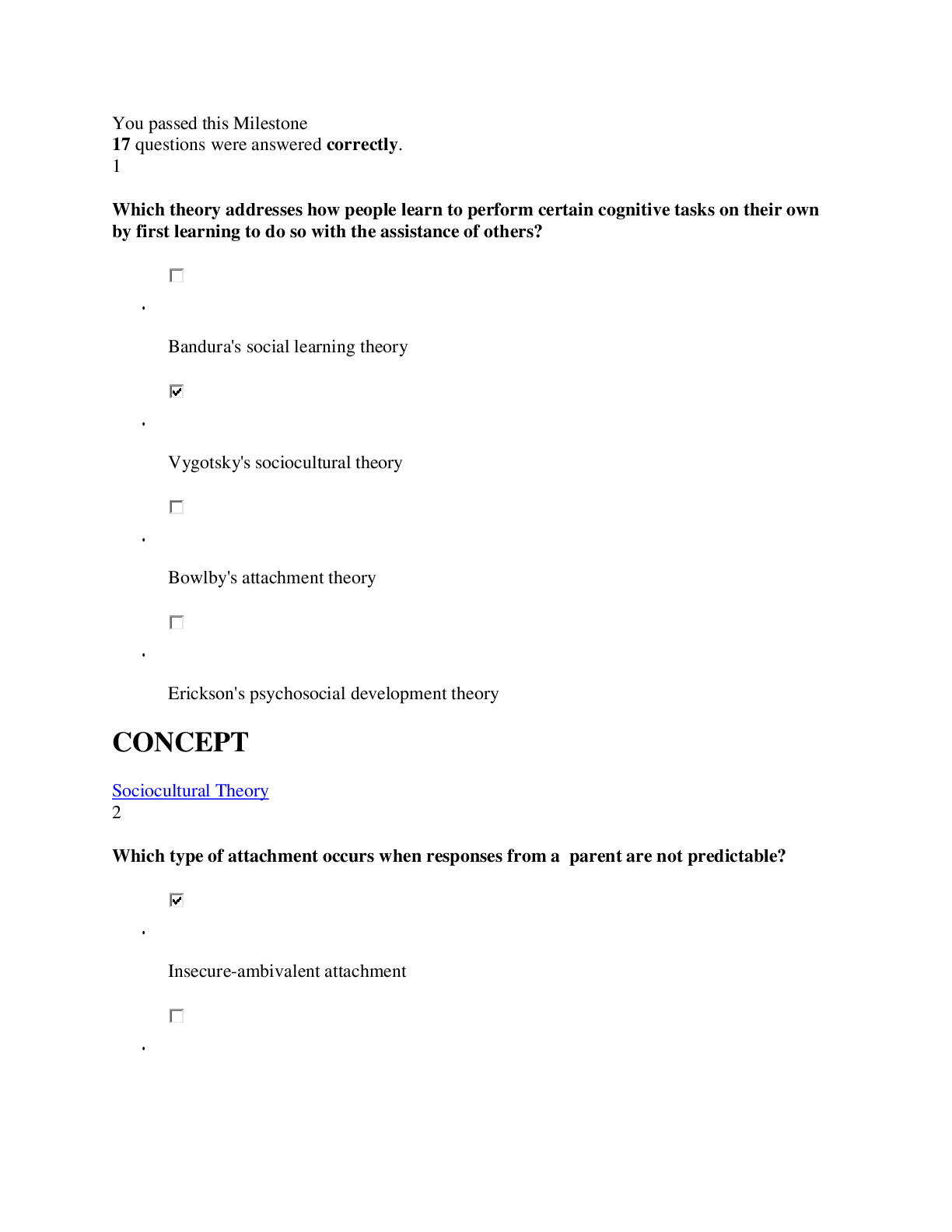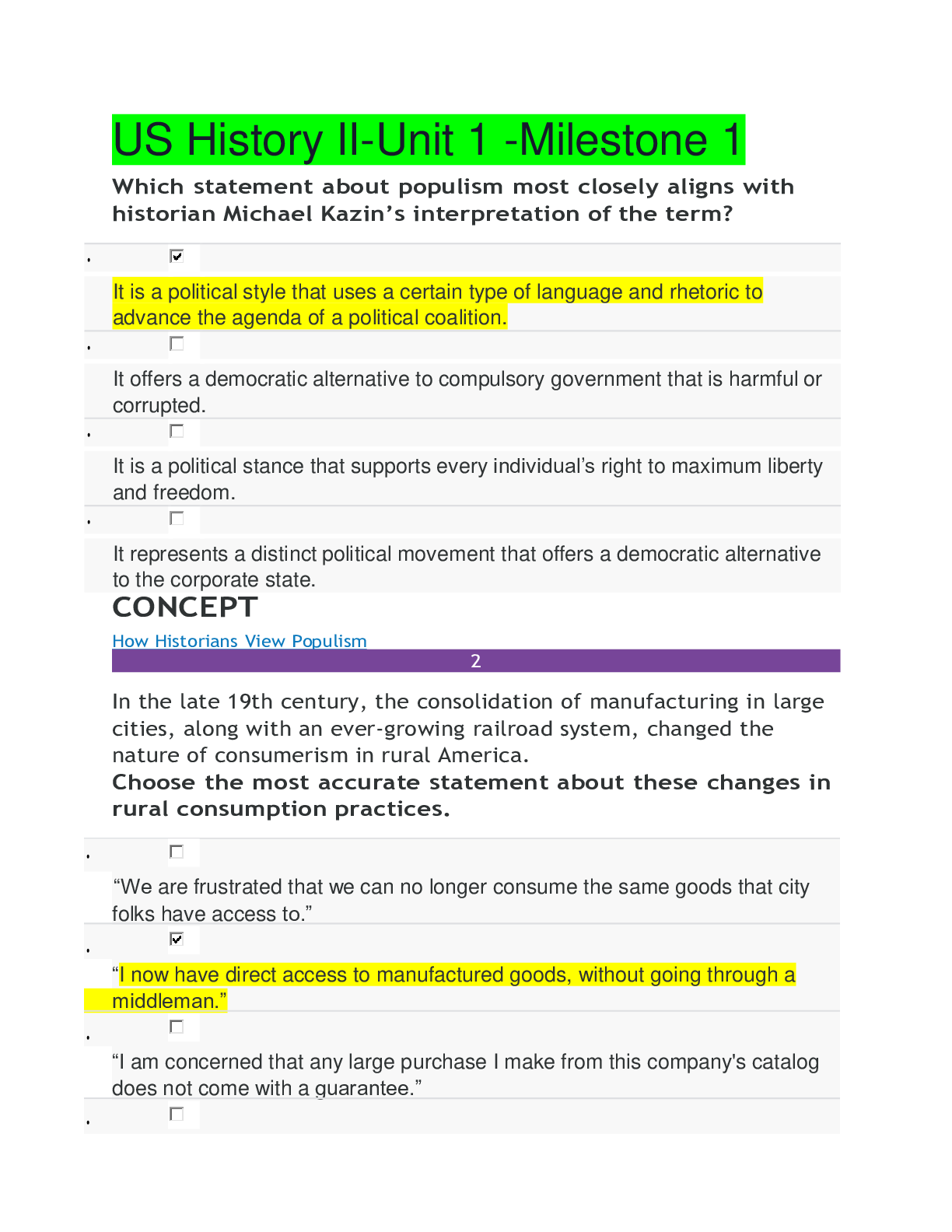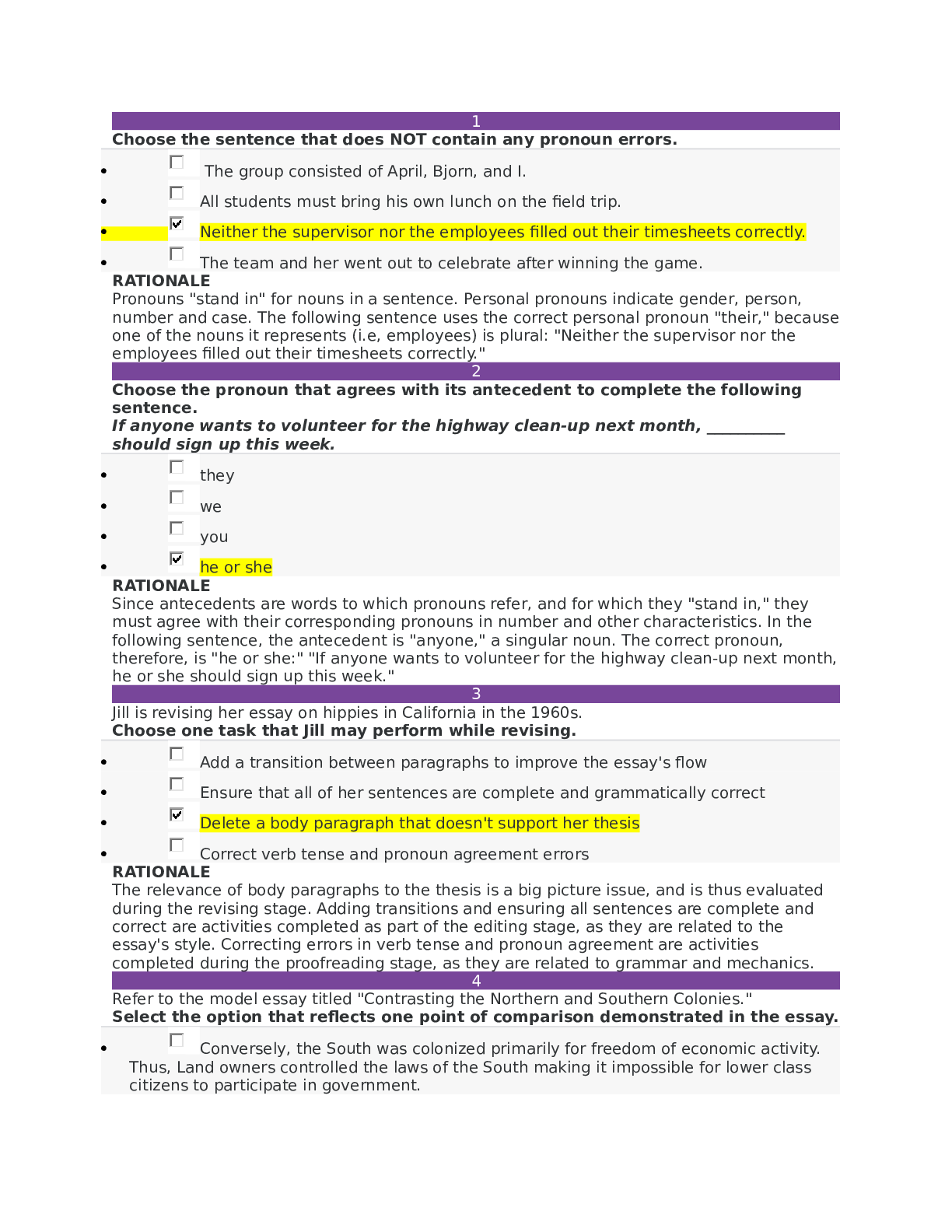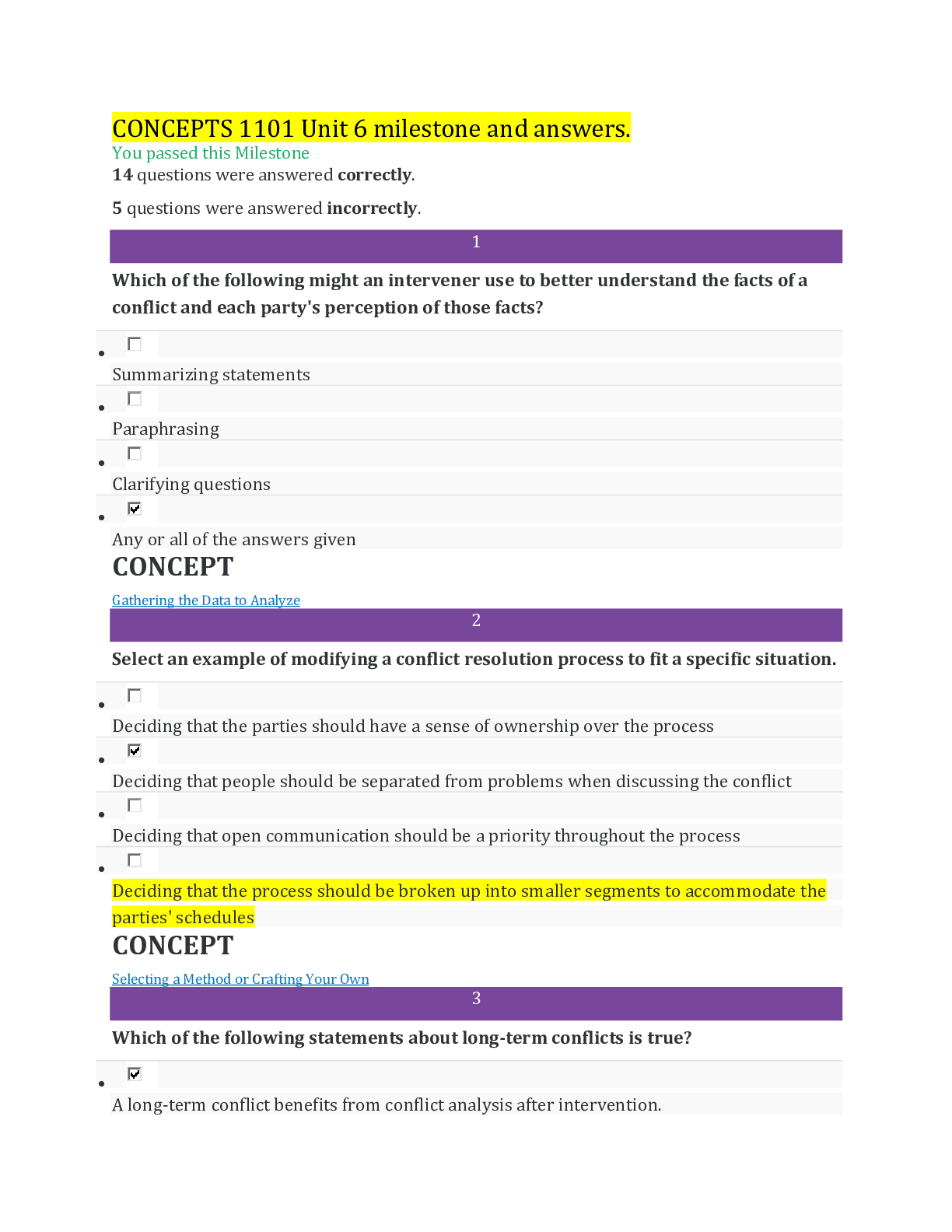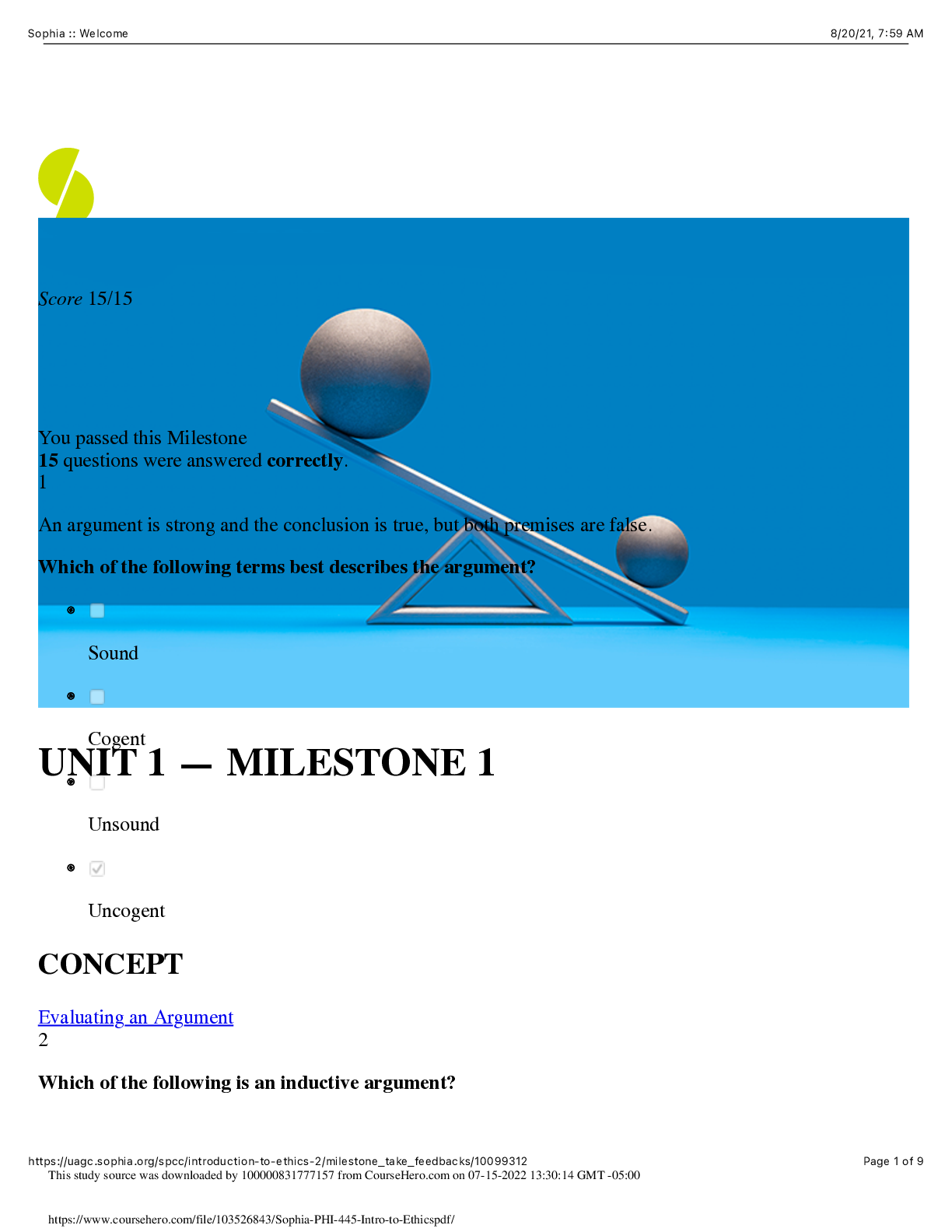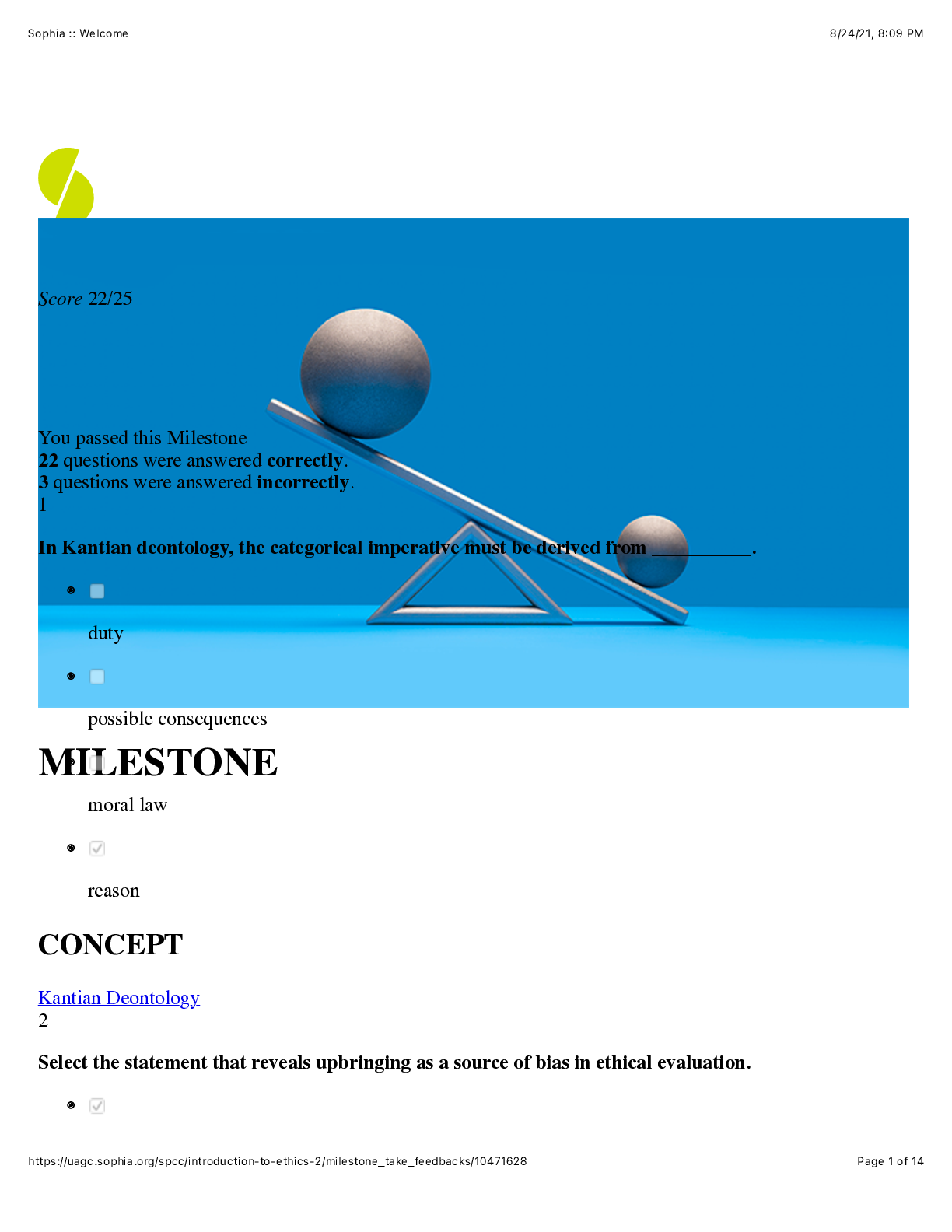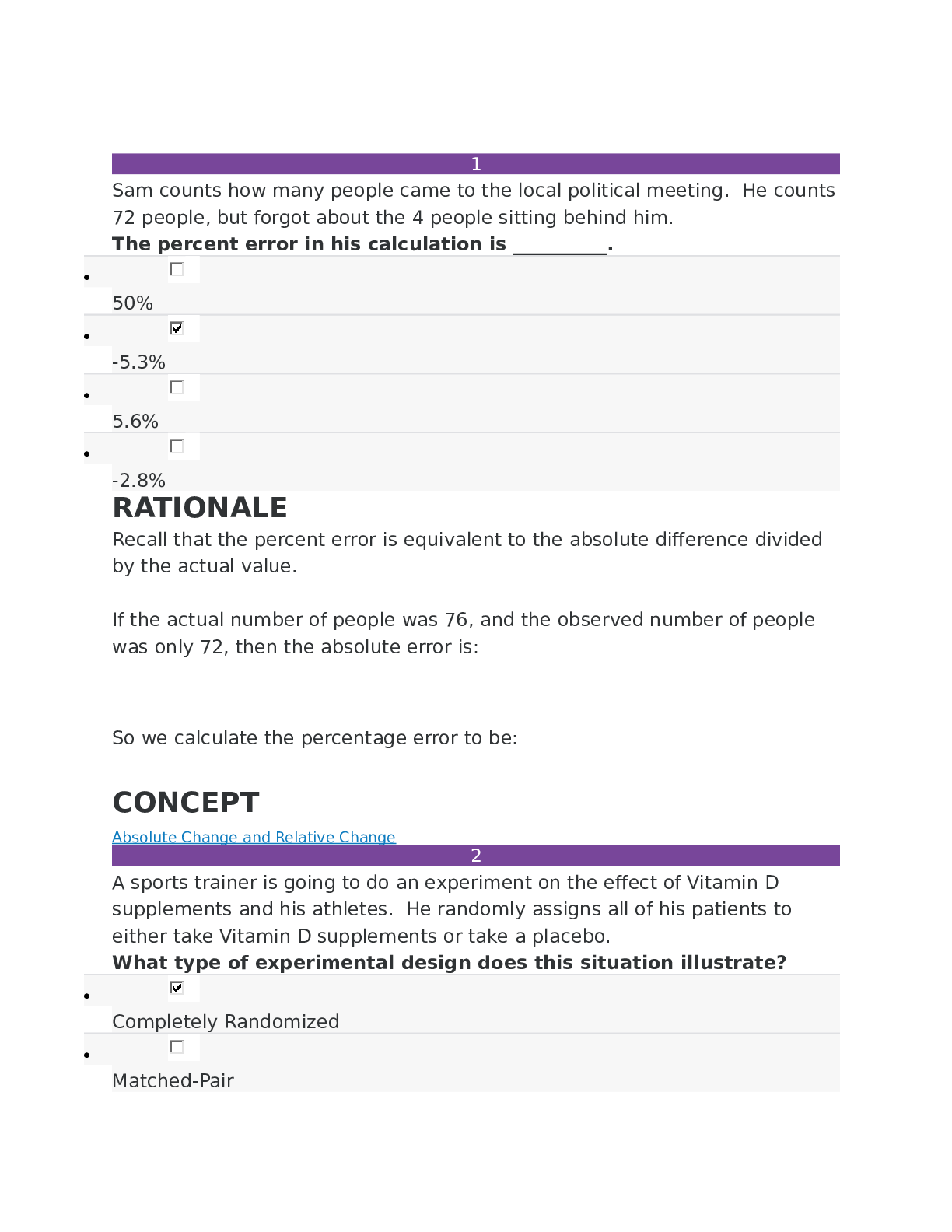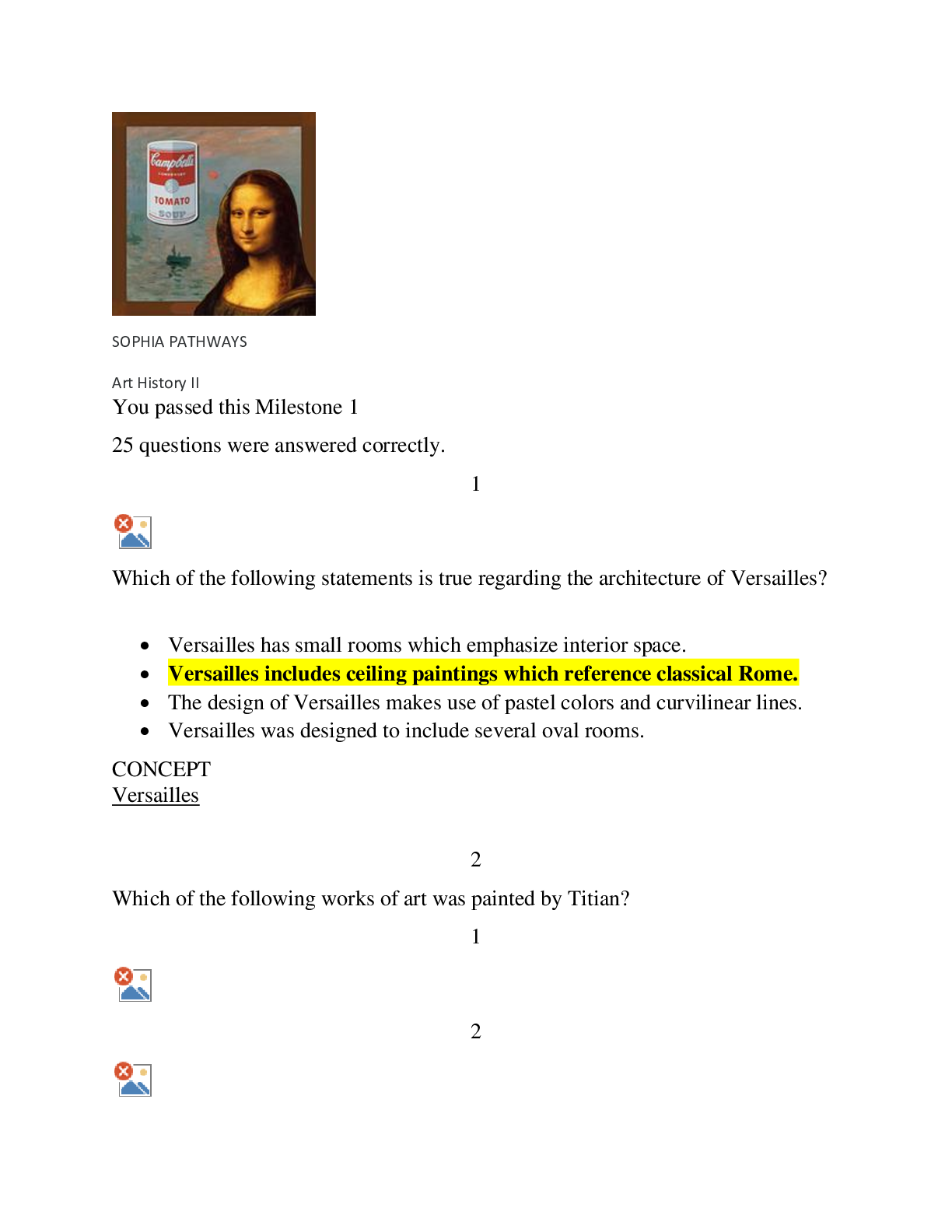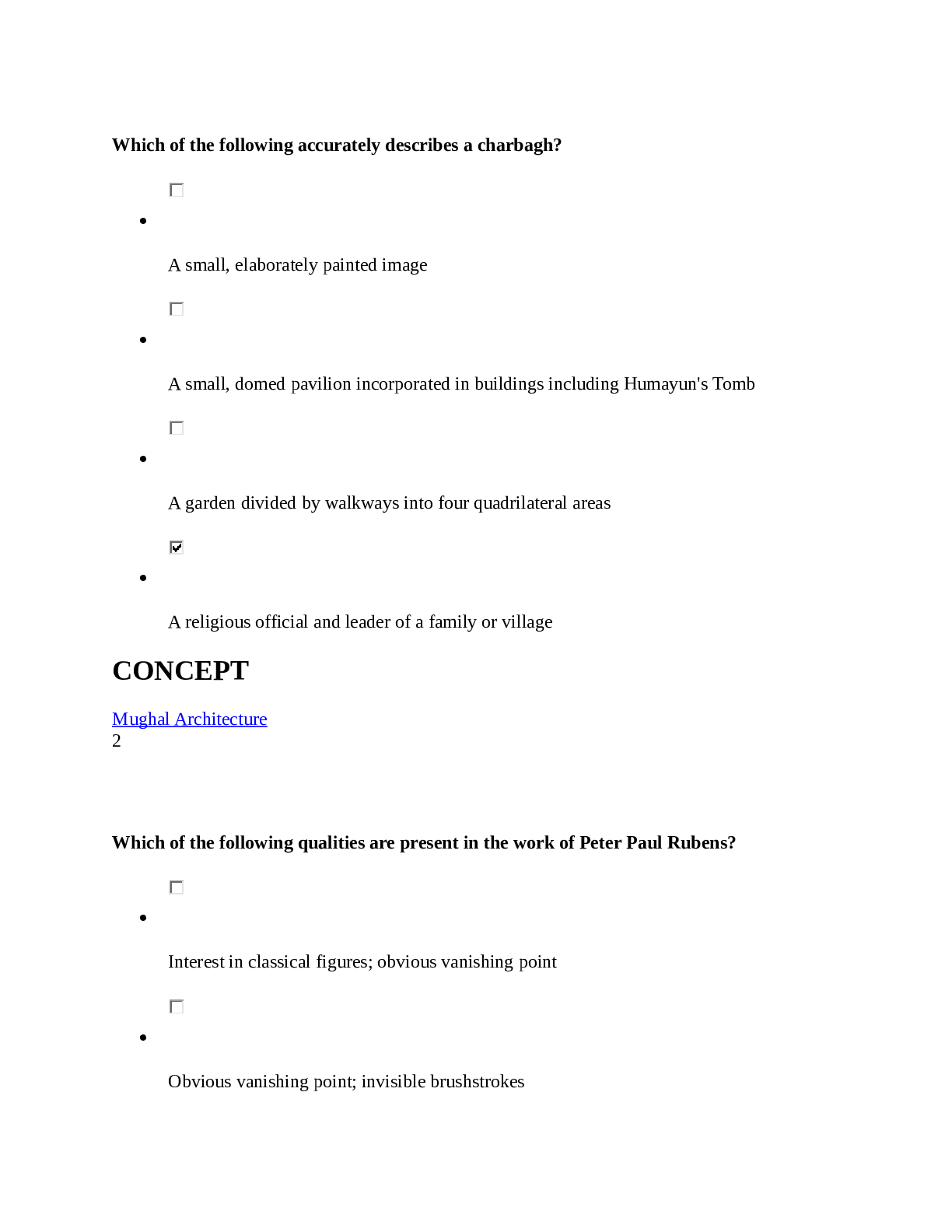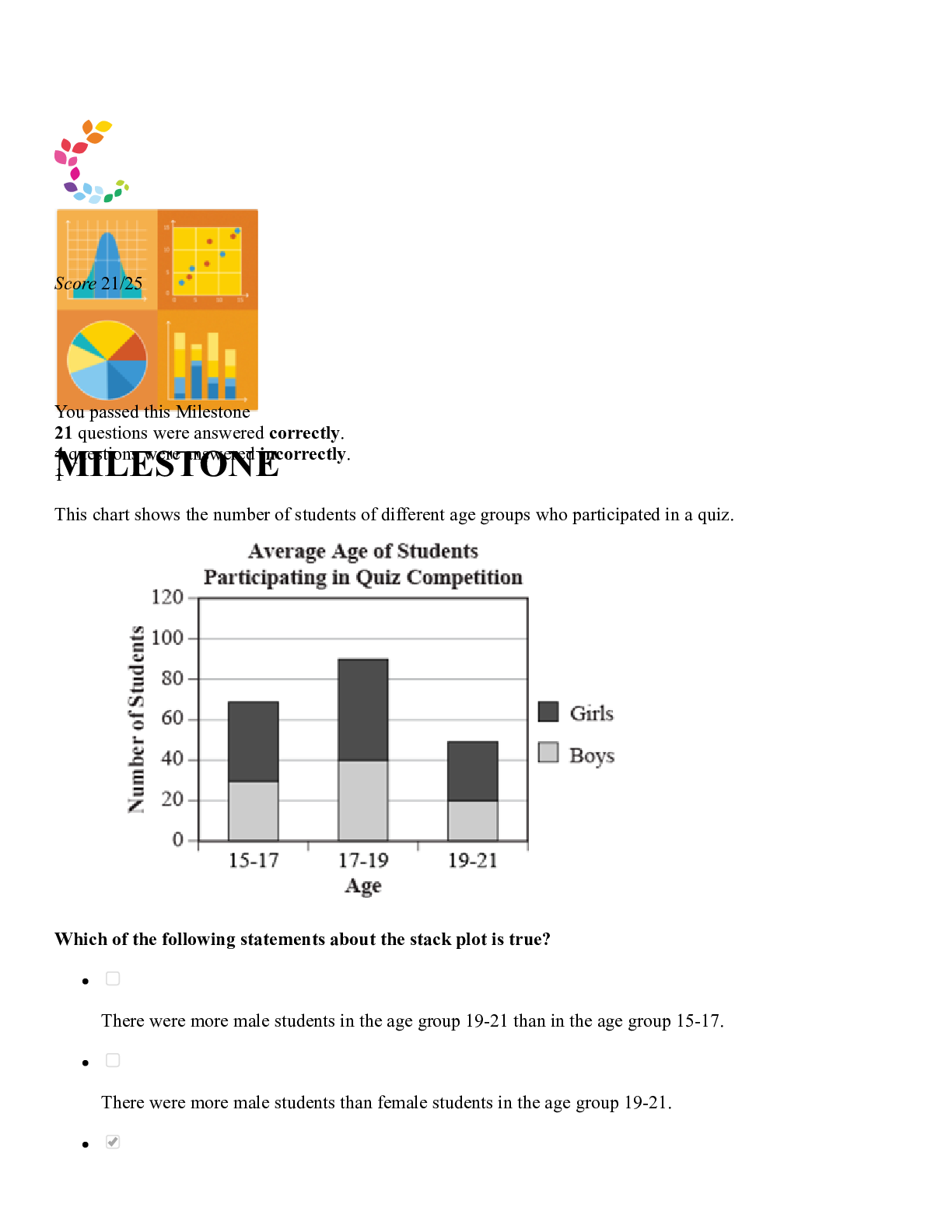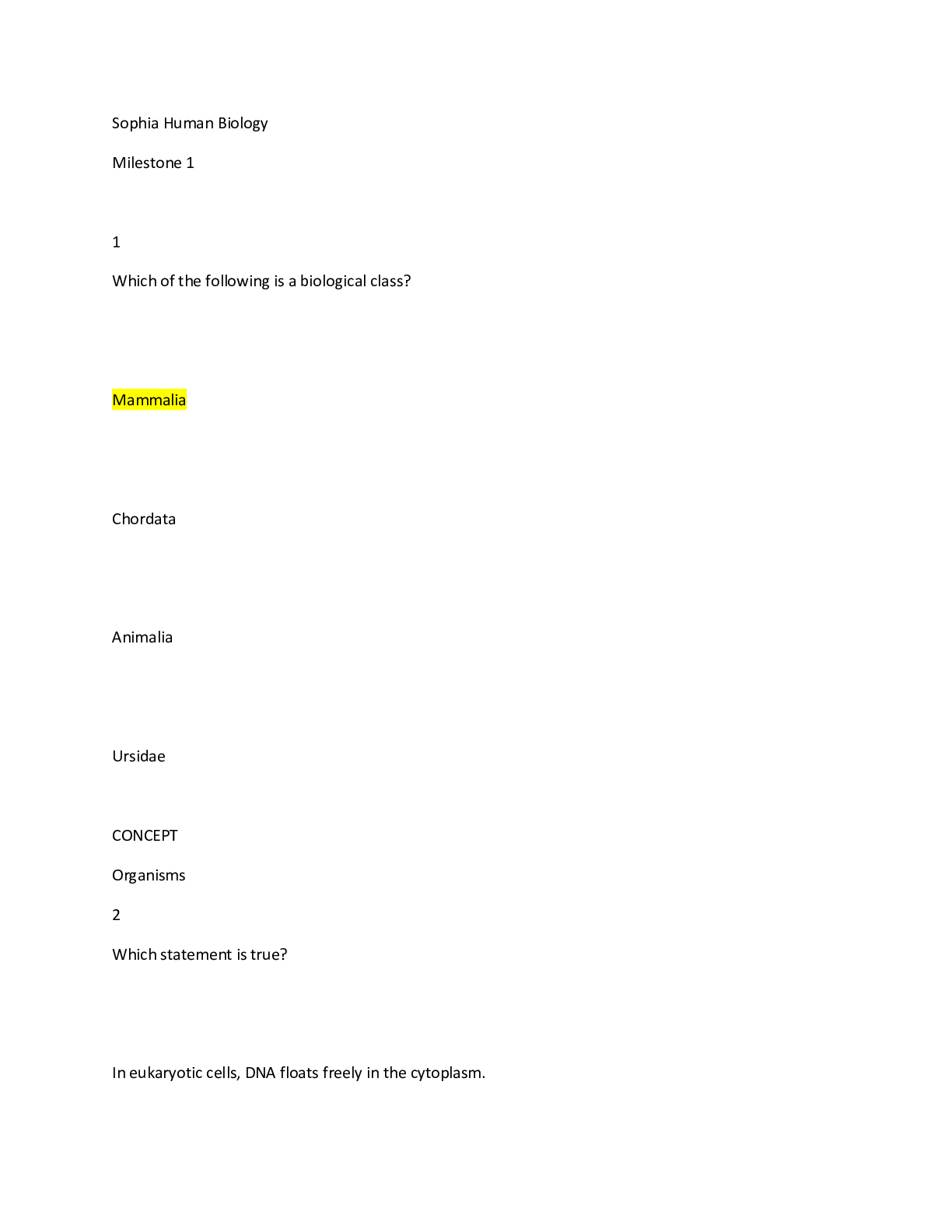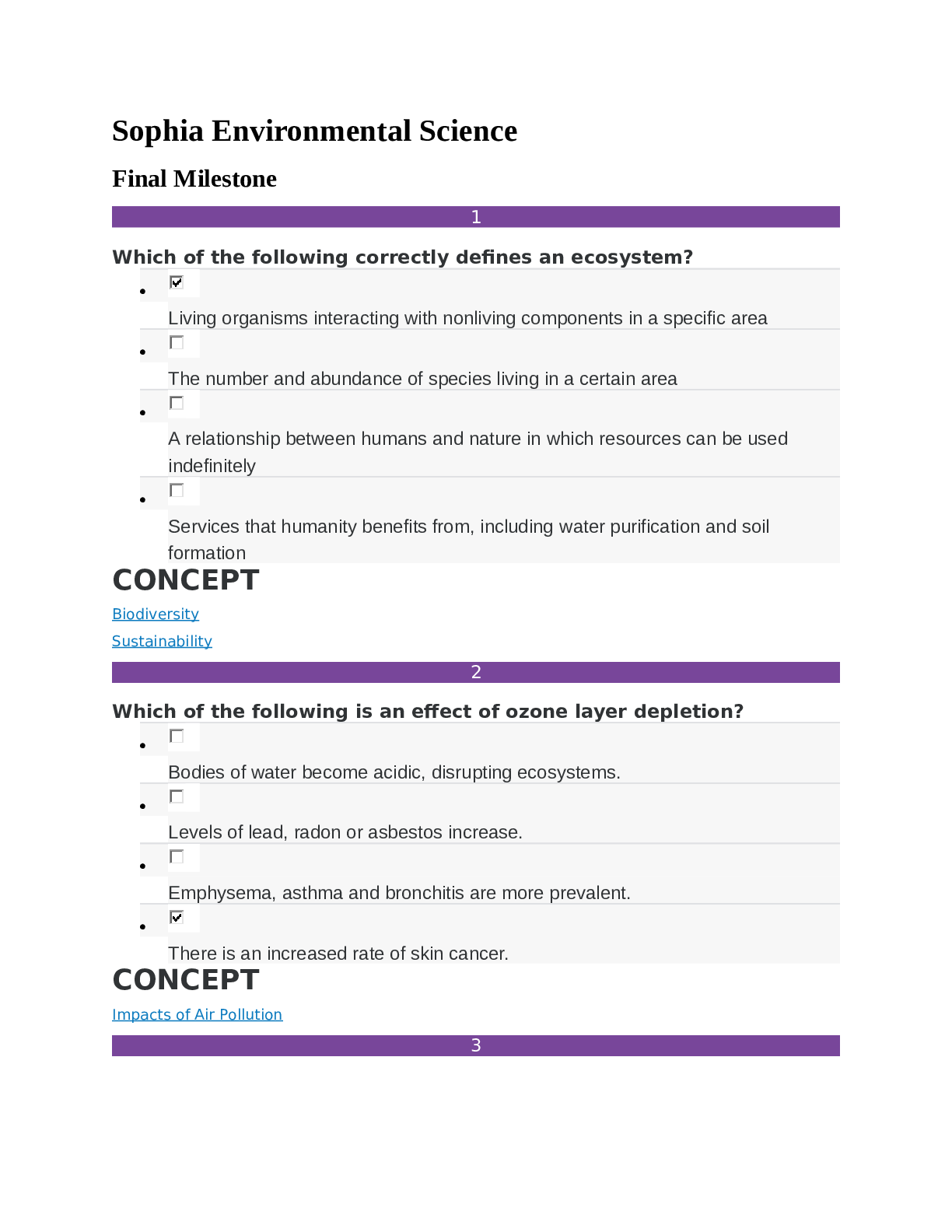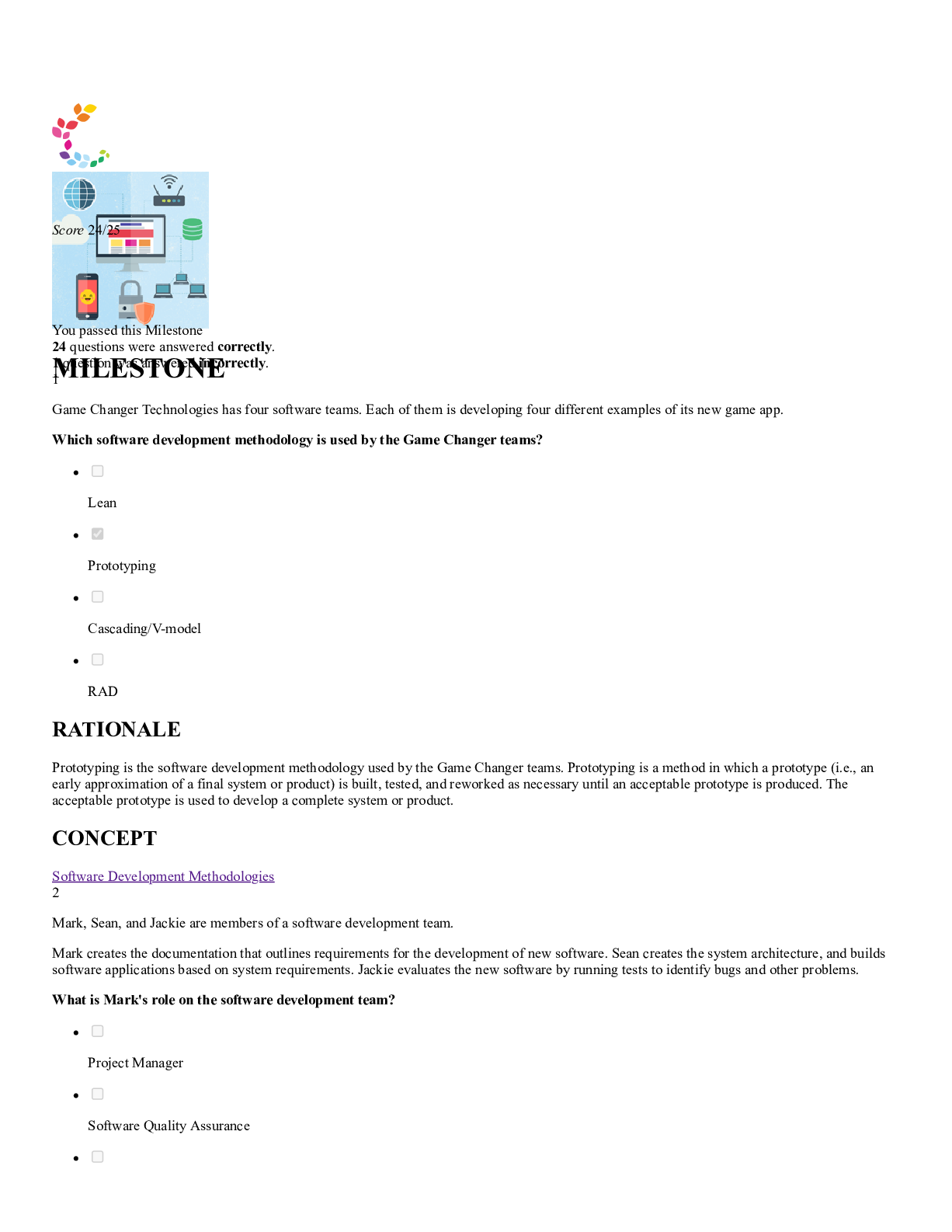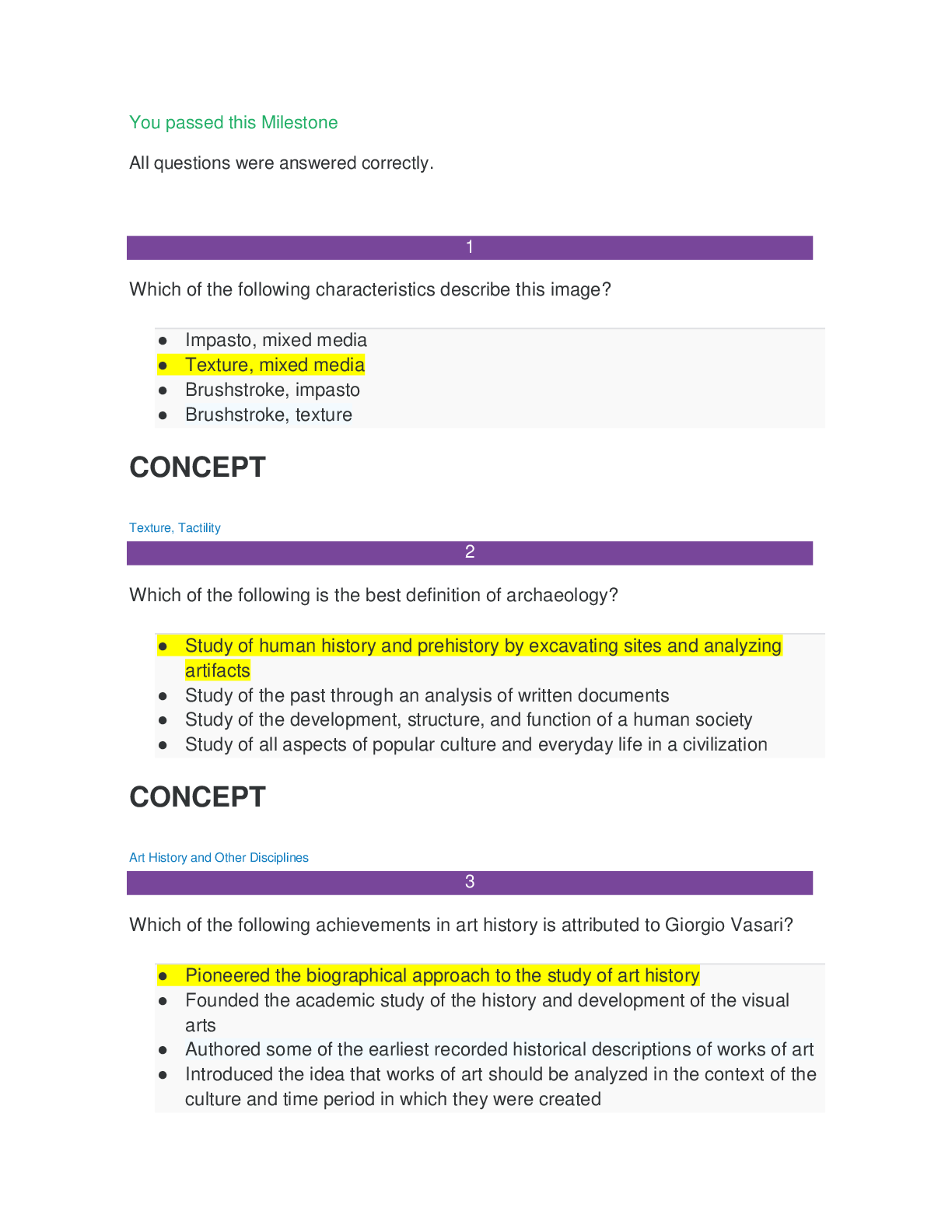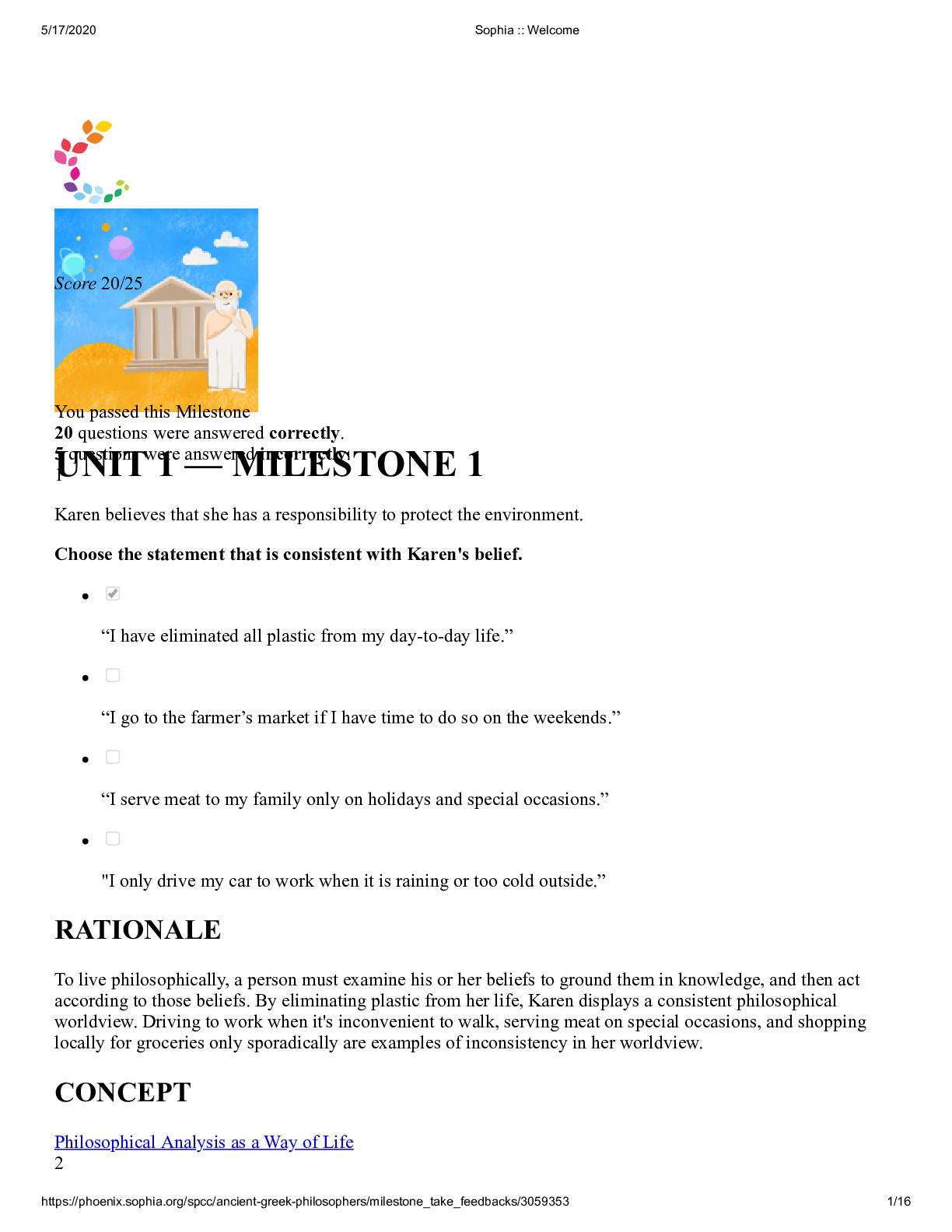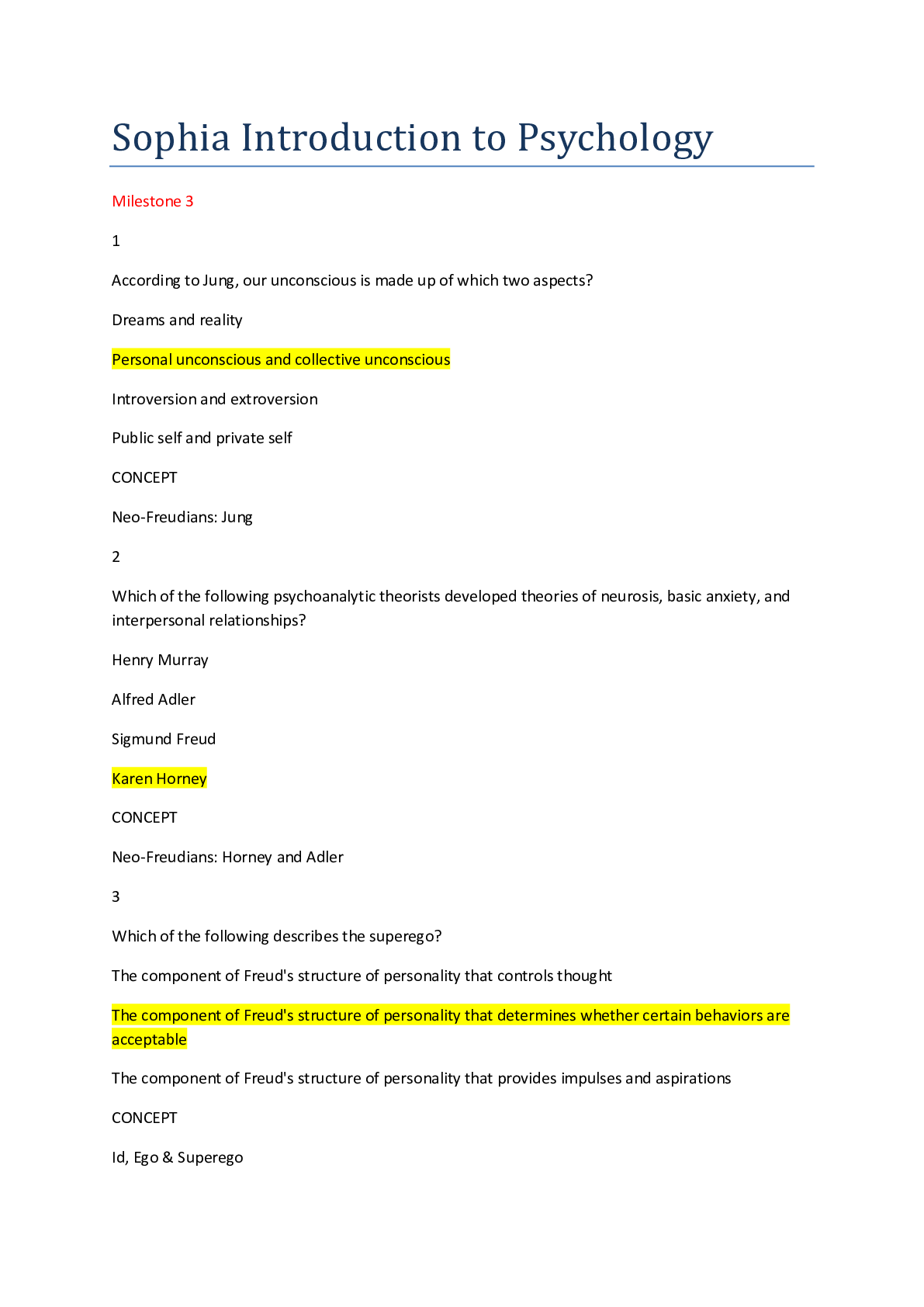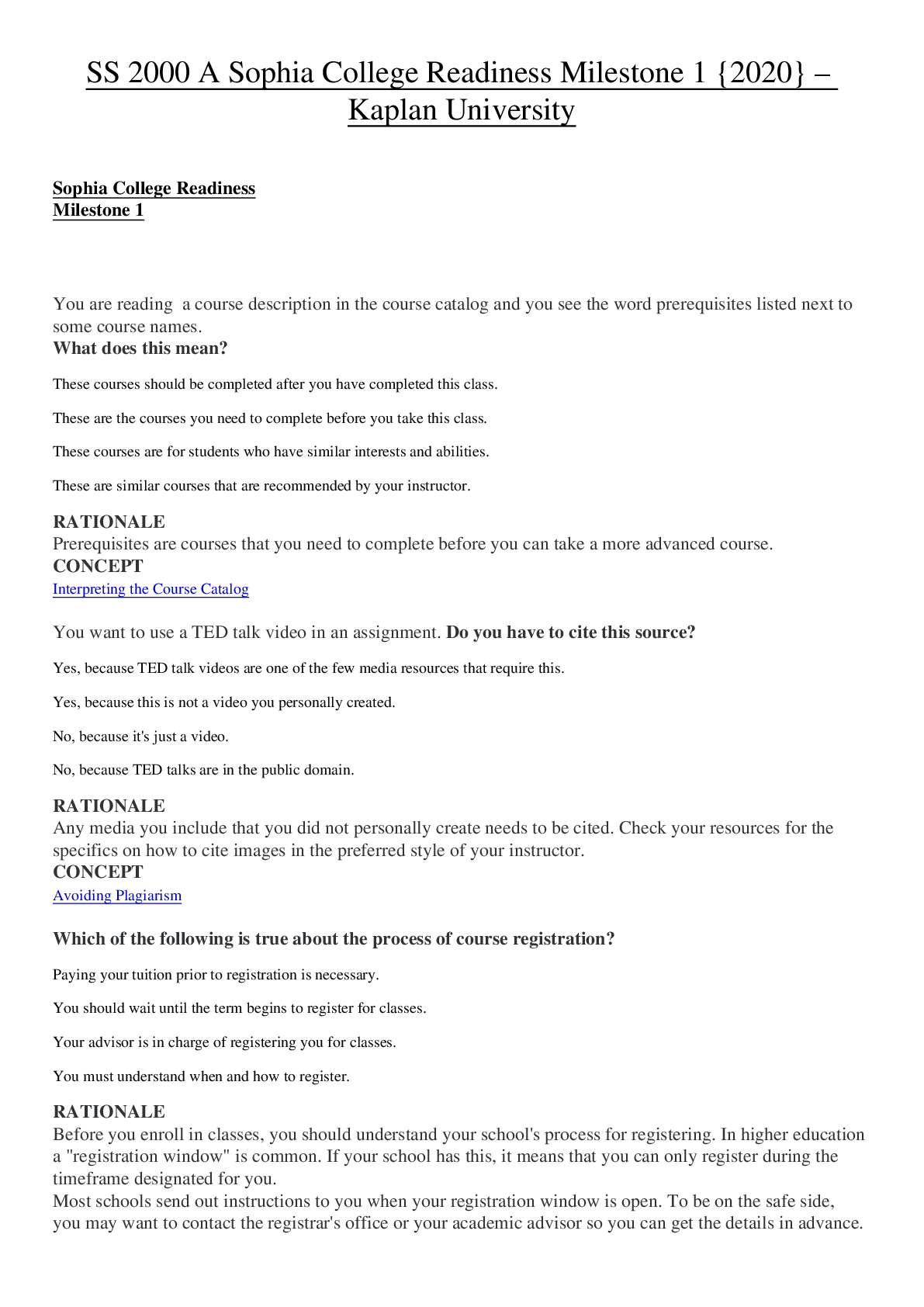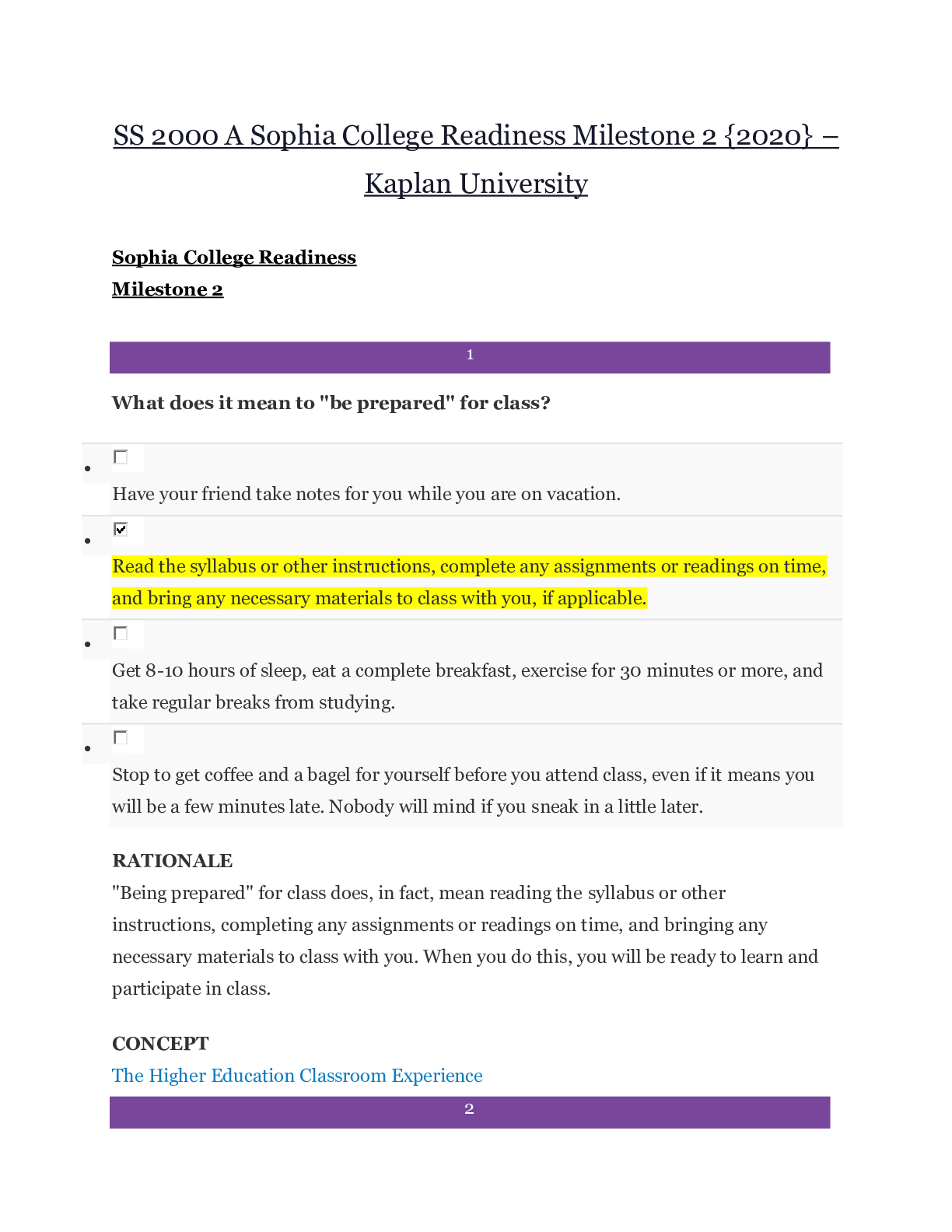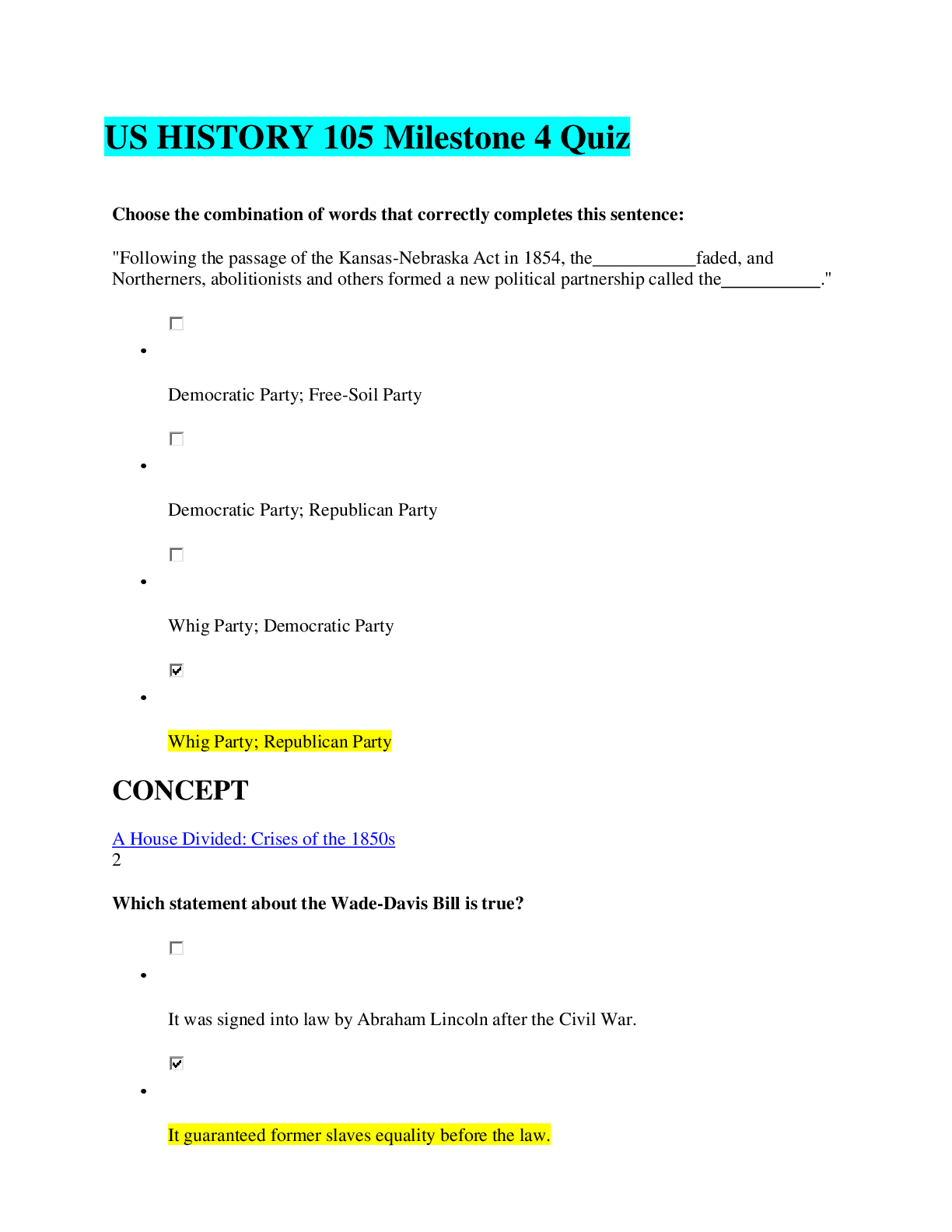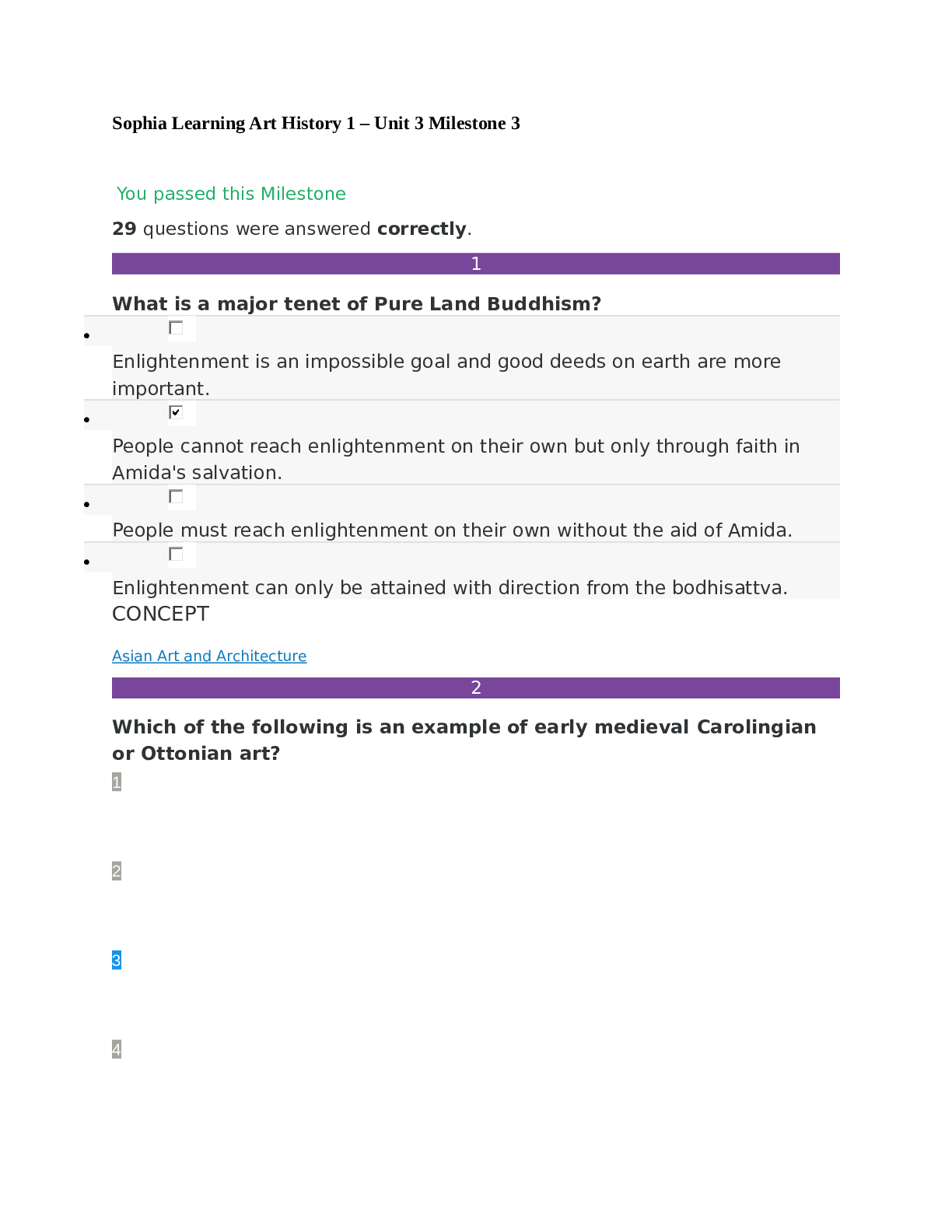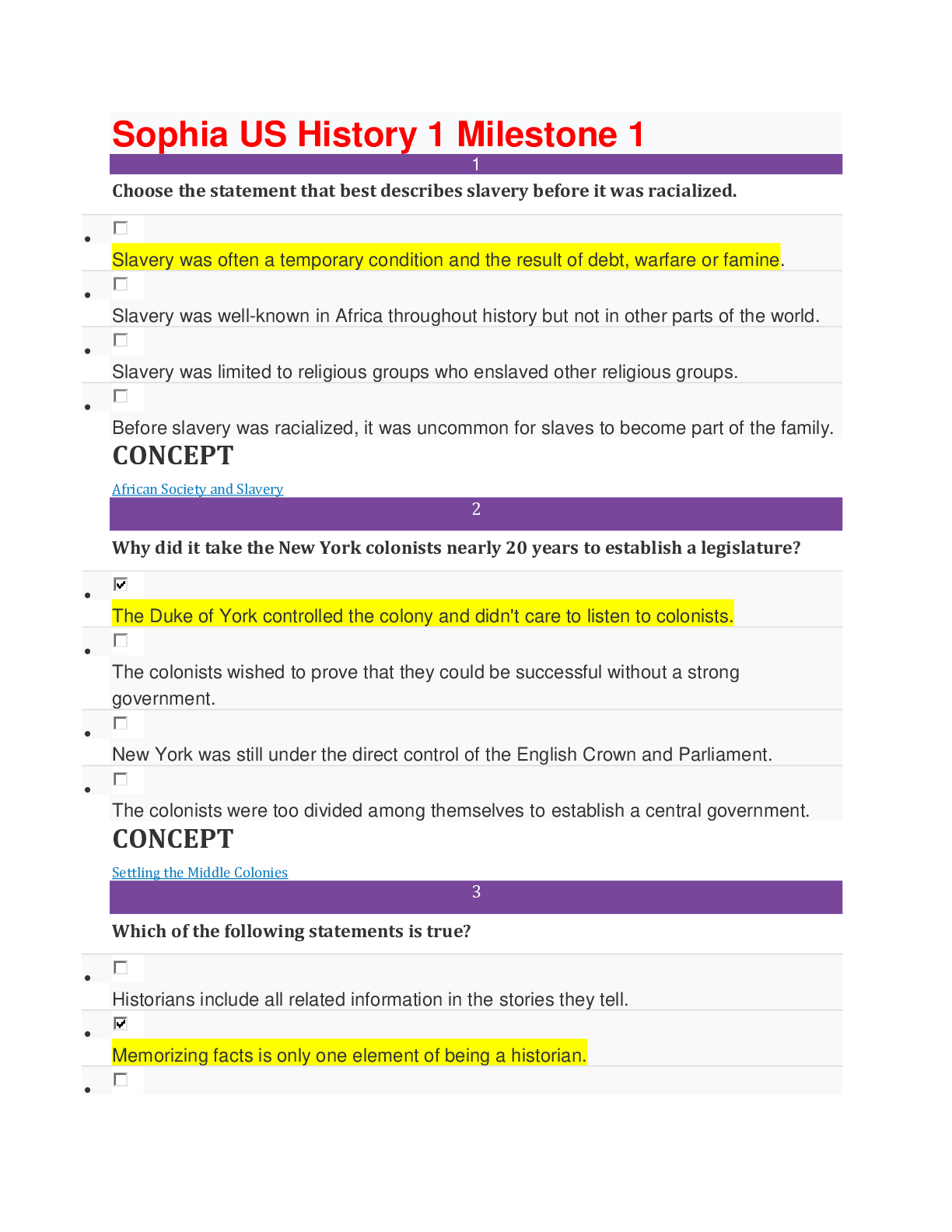*NURSING > SOPHIA Milestone > US History II Unit 1 milestone 1 (V2) Sophia _Complete Questions & Answers (All)
US History II Unit 1 milestone 1 (V2) Sophia _Complete Questions & Answers
Document Content and Description Below
US History II Unit 1 milestone 1 1 Choose the statement that best characterizes the "New South" rather than the "Old South." • Manual labor was provided by slaves for the profit of their owner... s. • Black and white farmers joined forces to buy small plots of land. • Segregation and Jim Crow laws were supported by Supreme Court decisions. • State legislatures raised property taxes on wealthy landowners. CONCEPT Race in the New South 2 Choose the true statement about the nature of the rural economy in the late 19th century. • Although cotton remained a significant crop in the South, it was not profitable for many farmers. • Merchants and store owners extended credit to poor farmers at low-interest rates. • Farmers had significant influence over grain prices, enabling them to live comfortably. • Court cases to regulate interstate commerce to farmers' benefit were won with the aid of strong farmers unions. CONCEPT Rural America in the Late 19th Century 3 Identify the most important reason that the election of 1896 was significant in American politics. • Both presidential candidates traveled and gave public speeches during the campaign. • Voters settled the question of how many immigrants would be admitted to the country on an annual basis. • One party used corporate campaign donations to hire speakers and print literature to discredit the opponent. • The Democratic, Republican and Populist Parties all gained strength as independent political entities. CONCEPT The Election of 1896 4 Choose the most accurate statement about the nature of politics in the Gilded Age. • The federal government demonetized silver, which was unpopular with corporate leaders. • Presidents owed their elections to the votes of ordinary citizens rather than to partisan allies. • The federal government often intervened in the lives of ordinary citizens during the Gilded Age. • Candidates and officials exchanged favors with political machines for votes. CONCEPT Gilded Age Politics 5 What was one reason numerous social reform movements emerged in the late 1800s? • Urban areas had too many people without the infrastructure to protect or support them. • The Catholic Church emphasized the need to save the souls of the poor and uneducated. • An influx of unskilled immigrants to rural areas overwhelmed the job and housing markets. • The steep rise of labor unions largely ignored the needs of the urban poor. CONCEPT Growth of the City 6 In the late 19th century, the consolidation of manufacturing in large cities, along with an ever-growing railroad system, changed the nature of consumerism in rural America. Choose the most accurate statement about these changes in rural consumption practices. • “The price for a mail-order tractor is much higher than what our local supplier charges.” • “With access to credit, we can purchase items that were previously available only to the wealthy.” • “I only have access to a few goods from a single local supplier.” • “We enjoy the personal interactions with the mail-order companies we purchase products from.” CONCEPT Industrialization and Consumer Culture 7 Consider the excerpt from a speech given by the former slave and abolitionist Frederick Douglass to the Massachusetts Anti-Slavery Society: "I have had but one idea for the last three years to present to the American people, and the phraseology in which I clothe it is the old abolition phraseology. I am for the 'immediate, unconditional, and universal' enfranchisement of the black man, in every State in the Union. [Loud applause.] Without this, his liberty is a mockery; without this, you might as well almost retain the old name of slavery for his condition; for in fact, if he is not the slave of the individual master, he is the slave of society, and holds his liberty as a privilege, not as a right. He is at the mercy of the mob, and has no means of protecting himself." Which question would be most relevant for analyzing this historical speech? • How did Douglass deliver his speech? • How long is the speech? • When was the source published? • Why did Douglass give this speech? CONCEPT Analyzing Primary Sources 8 In the summer of 1893, a young historian, Frederick Jackson Turner, presented a paper that explained his views on the significance of the frontier in American history. Choose the statement that best reflects Turner’s views on the significance of the Western frontier. • Turner examined the ways in which settlers interacted with each other to form unique societies on the frontier. • Turner included women in his argument, suggesting that the West was for all people and not just rugged, masculine individuals. • Turner regretted the need for the subjugation of Native Americans. • Turner stated that Western expansion repeated American history by demonstrating and reinforcing the exceptionalism and progress of the American people. CONCEPT The Frontier in American History 9 Consider “The Chinese Question” by Thomas Nast, published in Harper’s Weekly, February 18, 1871. Choose the statement that best analyzes the experience of immigrants portrayed in the image. • Chinese immigrants assimilated more successfully than other ethnic groups. • Chinese immigrants were protected by the United States government. • Chinese immigrants were targeted with hate speech and anti-immigrant sentiment. • Chinese immigrants directly competed with Irish immigrants for jobs. CONCEPT Late 19th Century Immigrant Experience 10 Choose the statement that best reflects historian Lawrence Goodwyn’s interpretation of populism. • Populism was a form of egotism that prevented people from considering issues outside of their own views. • Populism was a political style that has often been revisited and repeated by conservative presidential campaigns. • Populism was a movement against the politics of the Gilded Age that supported big business rather than farmers and laborers. • Populism was an authoritarian view of politics aimed at electing leaders who were strongly anti-immigrant. CONCEPT How Historians View Populism 11 Which list of activities best represents the basic practices of historians? • o Asking questions about the nature of history, o interpreting evidence from the past, o remaining objective and o selecting relevant primary and secondary sources • o Maintaining consistency in historical narratives over time, o insisting on a single narrative for the past, o referencing strongly biased secondary sources and o stating personal opinions about the past • o Asking questions about the future, o insisting on a single narrative for the past, o selecting relevant primary and secondary sources and o stating personal opinions about the past • o Asking questions about the nature of history, o insisting on a single narrative for the past, o selecting relevant primary and secondary sources and o stating personal opinions about the past CONCEPT The Historian's Practice 12 Which of these is an example of a primary source for historical research on America's westward expansion? • A history book about U.S. westward expansion • A recorded interview with an American Indian • A journal article about population changes in the U.S. • A new documentary about Native American experiences in the 1890s CONCEPT Analyzing Primary Sources 13 Suppose two competing railroad companies agreed to fix shipping rates at a level that benefited both. What is this kind of voluntary arrangement called? • A pool • A trust • A monopoly • A holding company CONCEPT Corporations and Industry in the Late 19th Century 14 Read the excerpt from a memoir written by Allan Pinkerton about the Great Railway Strike of 1877. "For this reason the strike of '77 was a complete failure. Although in many instances riotous excesses were not committed, the attempt of which they were all guilty—to prevent the movement of trains—made their strike as truly a riotous proceeding as the pillage, arson, and murder of Pittsburgh could have made it. By this act the strikers placed themselves in an attitude of defiance to all law and to society, and as surely arrayed law, order, and society against them. Had they won, it would have been a triumph of anarchy; and anarchy is a something impossible to exist. No community can exist save under law and order; and no riotous strike is possible of success short of revolution; while revolution itself is a failure, unless it brings to a people a still purer law and a more secure order." What group of people would most likely agree with Allan Pinkerton's opinion? • President Hayes • the Knights of Labor • Anarchists • Railroad workers CONCEPT Labor Conflict in the Gilded Age 15 Rosemary is curious about the history of the Amish in America and begins her research at the library. As a historian, she is aware of possible influences on her interpretation of events. Which factor should be allowed to influence her interpretation? • The language she uses • The historical question she wants to ask • What her conclusion will be • Her personal bias toward the Amish CONCEPT The Historian's Practice 16 Choose the factor that was most likely an effect of rapid industrialization in the United States during the late 19th century. • Increased reliance on local shops and markets • Rapid growth of the interstate highway system • Improvements in communication such as the telephone • Local safety regulations on tenement housing CONCEPT Growth of the City 17 "In the 1930s Dust Bowl, soil across large swathes of the American midwest dried out and was carried into the air creating massive dust storms like this one." A historian would most likely make this statement if they were analyzing this image through what historical lens? • Class • Economics • Race • Environment CONCEPT The Lenses of History 18 White Democrats, or "redeemers," were central to the development of the Jim Crow system in the South during the late 19th century. Which statement most represents their efforts? • They supported efforts to improve the condition of poor white citizens as well as poor black citizens. • They held rallies to highlight challenges facing small business owners. • They worked to dismantle unions that had farmers and common laborers as members. • They passed laws that required potential voters to read and interpret the Constitution to the satisfaction of white voting registrars. CONCEPT Race in the New South 19 Choose the statement that best reflects an argument used by Chief Joseph to oppose federal assimilation. • "The government is not planning to provide us with enough land to grow crops." • “If the white man wants to live in peace with us, we only ask that all men are treated equal and are subject to the same laws.” • “Indians want to live in peace and we are willing to forego our traditions in order to do so.” • “Indians must conform to American society in order to grow and advance as a people.” CONCEPT Western Conquest and Indian Assimilation 20 Several ideologies—social Darwinism, the self-made man and the Gospel of Wealth—emerged in the Gilded Age. Choose the person from the Gilded Age whose ideas are reflected in this statement: "There is a difference between the deserving and the undeserving poor." • Herbert Spencer • Mark Twain • Andrew Carnegie • Henry George CONCEPT The Gilded Age 21 During the late 1800s, dreams of the West held by prospective settlers were not matched by the realities. Choose the statement that describes a myth of the West. • “It is the destiny of white Americans to claim the West as their own.” • “Farmers face many weather-related challenges, from drought to low temperatures.” • “Railroads charge high rates for shipping farm equipment to sparsely-populated locations.” • "Life as a cowboy means working for low wages in the service of wealthy land owners." CONCEPT Homesteading 22 Choose the true statement about the Knights of Labor. • It was founded in Huntsville, Alabama. • It required members to understand spoken English. • It originated in 1866 as a society of shoemakers. • It called for equal pay and the elimination of convict labor. CONCEPT Working Class Life and Labor Unions in the Gilded Age 23 Because of the economic downturn in the 1890s, many Americans organized to seek relief from corporations and elected officials. Choose the statement that best reflects how farmers responded to the crises of the 1890s. • They continued to face debt and marginalization in the modern economy and sought an alliance with industrial workers. • They viewed the financial crisis as a result of the Sherman Silver Purchase Act and supported its repeal. • They had little sympathy for workers’ protests for relief. • They engaged in a gunfight with Pinkerton detectives and killed several of them. CONCEPT Economic Depression and Labor Unrest in the 1890s 24 Which of the following were goals of the Populist Party in the late 19th century? • To lessen government influence in citizens' lives • To promote government ownership of the railways • To abolish labor unions • To deregulate the banking industry CONCEPT Rural America in the Late 19th Century [Show More]
Last updated: 8 months ago
Preview 1 out of 12 pages
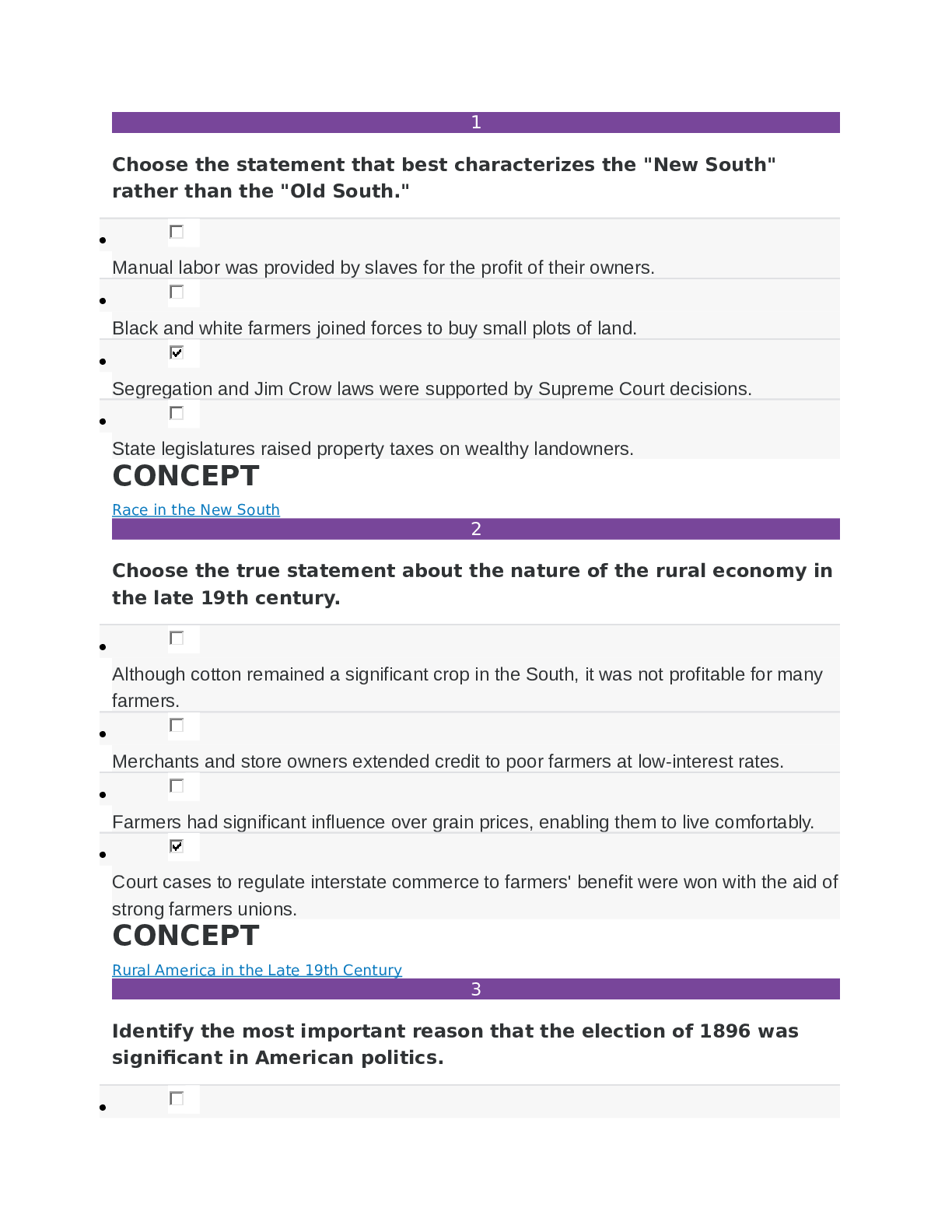
Reviews( 0 )
Document information
Connected school, study & course
About the document
Uploaded On
Sep 14, 2020
Number of pages
12
Written in
Additional information
This document has been written for:
Uploaded
Sep 14, 2020
Downloads
1
Views
215

